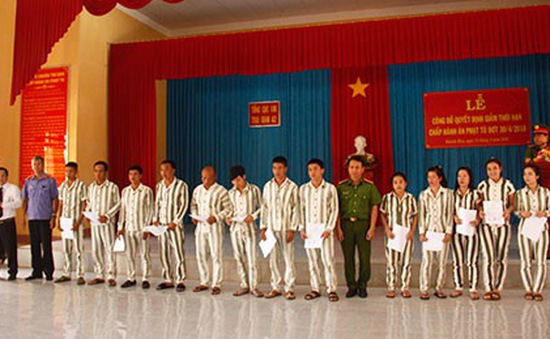Inmates in Vietnam are eligible to receive a general medical examination at least once every two years
Recently, the Government of Vietnam has issued Decree 133/2020/ND-CP detailing the implementation of several provisions of the Law on Execution of Criminal Judgments.

Inmates in Vietnam are eligible to receive a general medical examination at least once every two years (Illustrative image)
According to Article 9 of Decree 133/2020/ND-CP, inmates, upon arriving at the detention facility, are to be examined by the medical staff, and a health monitoring card is to be prepared. During the period of serving their sentence, the detention facility, based on the conditions, duration of serving the sentence, and its specific situation, will cooperate with the district-level or provincial hospital, Police hospital, and Military hospital where the detention facility is located to organize a general health check-up for inmates periodically at least once every 02 years. Specifically, this includes measuring height, weight, average chest circumference, checking heart rate, blood pressure, body temperature, and conducting a comprehensive clinical examination by specialty fields. The results are recorded in the inmate's file for health management and monitoring. The costs for the periodic health check-ups for inmates are paid according to the price framework prescribed by the Ministry of Health. The detention facility regularly implements measures to prevent diseases, ensure food safety, and prevent natural disasters, accidents, and injuries.
Additionally, inmates who are ill or injured upon arriving at the detention facility receive medical examination, treatment, and care at the facility's medical unit. In cases where the illness or injury exceeds the treatment capability of the detention facility, the head of the detention facility decides to transfer the inmate to a higher-level health facility, such as a district or provincial hospital, or a military region hospital for treatment. If the treatment capability of the provincial or military region hospital is exceeded, the head of that health facility will recommend further treatment, and the head of the detention facility will report to the Agency for Criminal Judgment Execution Management under the Ministry of Public Security (for prisons managed by the Ministry of Public Security) or the Agency for Criminal Judgment Execution Management under the Ministry of National Defense (for prisons managed by the Ministry of National Defense) for consideration and decision on subsequent treatment. Additionally, the inmate's family or representative must be informed to coordinate in the care and treatment. The diet, medication, and nutrition for inmates treated outside the detention facility's health care unit are provided as prescribed by the health care unit.
Especially, district-level, provincial hospitals, and military hospitals where detention facilities are located are to allocate land within the hospital grounds to build a separate treatment area for inmates. If land is unavailable, they must allocate at least three separate treatment rooms within the health facility to treat inmates, ensuring security, order, and facilitating inmate management. Hospitals are responsible for arranging medical officers and doctors to examine and treat inmates in accordance with regulations. When planning new hospital construction, the health facility must notify the detention facility to coordinate in land allocation and design.
Note: Medication costs for ordinary diseases of inmates are equivalent to 03 kg of rice per inmate per month.
For inmates showing signs of mental illness or other conditions reducing cognitive or behavioral control abilities, while awaiting a decision from the provincial-level People's Court or the military region-level Military Court, where the inmate is serving their sentence, to request a forensic psychiatric assessment, the head of the detention facility will cooperate with the provincial-level, centrally-governed city psychiatric hospital, the psychiatric department of the provincial general hospital, or the military region hospital where the unit is stationed to organize examination and treatment according to legal provisions. For inmates with a history of drug addiction, the detention facility will organize health examinations, care, and functional rehabilitation based on conditions and capabilities; if a inmate tests positive for drugs, the facility will coordinate with relevant agencies for detoxification as stipulated. inmates with HIV/AIDS, Tuberculosis, other infectious diseases, and chronic diseases receive care and treatment according to current legal regulations.
Detailed information is available in Decree 133/2020/ND-CP, which takes effect from December 25, 2020.
Le Vy
- Key word:
- medical examination
- inmate
- Vietnam
- Number of deputy directors of departments in Vietnam in accordance with Decree 45/2025/ND-CP
- Cases ineligible for pardon in Vietnam in 2025
- Decree 50/2025 amending Decree 151/2017 on the management of public assets in Vietnam
- Circular 07/2025 amending Circular 02/2022 on the Law on Environmental Protection in Vietnam
- Adjustment to the organizational structure of the Ministry of Health of Vietnam: Certain agencies are no longer listed in the organizational structure
- Vietnam aims to welcome 22-23 million international tourists in Vietnam in 2025
-

- Number of deputy directors of departments in Vietnam ...
- 15:04, 05/03/2025
-

- Cases ineligible for pardon in Vietnam in 2025
- 14:43, 05/03/2025
-

- Decree 50/2025 amending Decree 151/2017 on the ...
- 12:00, 05/03/2025
-

- Circular 07/2025 amending Circular 02/2022 on ...
- 11:30, 05/03/2025
-

- Adjustment to the organizational structure of ...
- 10:34, 05/03/2025
-

- Notable new policies of Vietnam effective as of ...
- 16:26, 11/04/2025
-
.Medium.png)
- Notable documents of Vietnam in the previous week ...
- 16:21, 11/04/2025
-
.Medium.png)
- Notable documents of Vietnam in the previous week ...
- 16:11, 02/04/2025
-
.Medium.png)
- Notable new policies of Vietnam to be effective ...
- 16:04, 02/04/2025
-
.Medium.png)
- Notable new policies of Vietnam effective from ...
- 14:51, 21/03/2025
 Article table of contents
Article table of contents
